|
|
|
Sort Order |
|
|
|
Items / Page
|
|
|
|
|
|
|
| Srl | Item |
| 1 |
ID:
115448
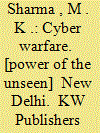

|
|
|
|
|
| Publication |
New Delhi, KW Publishers Pvt. Ltd., 2011.
|
| Description |
xi,245p.
|
| Standard Number |
9789380502748
|
|
|
|
|
|
|
|
|
|
|
|
Copies: C:1/I:0,R:0,Q:0
Circulation
| Accession# | Call# | Current Location | Status | Policy | Location |
| 056844 | 355.343/SHA 056844 | Main | On Shelf | General | |
|
|
|
|
| 2 |
ID:
107866
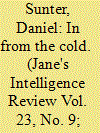

|
|
|
| 3 |
ID:
138608
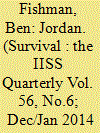

|
|
|
|
|
| Summary/Abstract |
Since the outbreak of civil war in Syria, Jordan has been contending with a flood of Syrian refugees, straining an already beleaguered economy. Moreover, the rapid spread of the Islamic State of Iraq and al-Sham (ISIS) across Iraq has substantially increased Jordan’s vulnerability to extremist infiltration and terrorist attacks. All this while, King Abdullah has continued to champion a reform programme – at least in name – to address Jordan’s most salient political and economic vulnerabilities following the Arab uprisings of 2011. So the last thing that Jordan needed this summer was a war between Hamas and Israel in Gaza.
|
|
|
|
|
|
|
|
|
|
|
|
|
|
|
|
| 4 |
ID:
133141
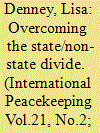

|
|
|
|
|
| Publication |
2014.
|
| Summary/Abstract |
Despite the widely accepted recognition that fragile and conflict-affected countries are characterized by plural security and justice orders, donor-led security and justice programmes continue to engage overwhelmingly with state actors on the basis of liberal peacebuilding models that internalize Weberian understandings of the state. In addition, policies pushing reformers towards engagement with 'informal', 'non-state', or customary systems often do so in a way that suggests a neat separation between the 'state' and 'non-state'. This does not reflect how security and justice operate in practice. This paper uses the case of Sierra Leone to demonstrate the panoply of actors that constitute the plural security and justice context there, and how these actors interact in practice. This reveals the highly interactive nature of the multiple security and justice chains commonly used in Sierra Leone. It is argued that in order to meaningfully engage with the multitudinous ways in which people access security and justice, external reformers need to develop a comprehensive understanding of this complexity. Such an understanding will assist reformers in transcending the increasingly unhelpful state/non-state distinction and in engaging with security and justice from the perspective of the end users, rather than from the perspective of externally derived models.
|
|
|
|
|
|
|
|
|
|
|
|
|
|
|
|
| 5 |
ID:
116394
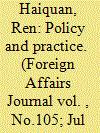

|
|
|
|
|
| Publication |
2012.
|
| Summary/Abstract |
Ladies and Gentlemen,
Dear friends,
Good evening!
I'm delighted to attend the World Peace Forum organized by Tsinghua University and to hold discussions with friends from various countries on the theme of "Win-Win for All: Peace, Security, Reform". I would like to take this opportunity to brief you on the policy and practice of the Chinese army participating in international security cooperation.
|
|
|
|
|
|
|
|
|
|
|
|
|
|
|
|
| 6 |
ID:
072882
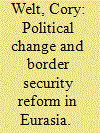

|
|
|
|
|
| Publication |
2005.
|
| Summary/Abstract |
This article presents four challenges to promoting border security in post-Soviet Eurasia, even in those states that have experienced regime change and profess new interest in constructing sound state institutions. The analysis is drawn from the specific example of Georgia-a major recipient of U.S. border security assistance and the site of several intercepted efforts of radioactive materials trafficking-but it is relevant to other states in the region, as well. The challenges assessed are: (1) the gradual nature of border regime reform, (2) trade-offs that subordinate border reform to other developmental priorities, (3) bureaucratic inertia and politics, and (4) the continued existence of unrecognized territories that lie beyond the reach of the state and of international law.
|
|
|
|
|
|
|
|
|
|
|
|
|
|
|
|
| 7 |
ID:
068205
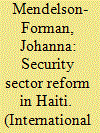

|
|
|
| 8 |
ID:
158058
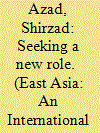

|
|
|
|
|
| Summary/Abstract |
With his frequent travels to the Middle East, more than all other Japanese leaders in the past, Shinzo Abe had been destined to ineluctably play a distinctive role in redefining his country’s foreign policy approach toward the region. Essentially, when Abe returned to power for a second time in late 2012, he succeeded to subsequently establish a relatively stable and long-term government which strived to critically reappraise some highly contentious elements of Japan’s internal and external policies. Reassessing Japan’s conventional low-profile orientation to the Middle East was particularly a major objective of the Abe government because the region had turned out to be closely and dubiously connected to some pivotal political and security reforms which Abe had long pursued to achieve domestically. By primarily doubling down Japan’s political engagement in different parts of the Middle East, therefore, Abe took advantage of what his country had capitalized in the region in more recent times to especially accelerate the accomplishment of some other political and security he favored ardently.
|
|
|
|
|
|
|
|
|
|
|
|
|
|
|
|
| 9 |
ID:
131307
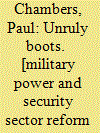

|
|
|
|
|
| Publication |
Frankfurt, Peace Research Institute frankfurt, 2013.
|
| Description |
iv, 37p.Pbk
|
| Series |
PRIF Report No.121
|
| Standard Number |
9783942532549
|
|
|
|
|
|
|
|
|
|
|
|
Copies: C:1/I:0,R:0,Q:0
Circulation
| Accession# | Call# | Current Location | Status | Policy | Location |
| 057772 | 355.0309593/CHA 057772 | Main | On Shelf | General | |
|
|
|
|
| 10 |
ID:
190686
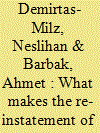

|
|
|
|
|
| Summary/Abstract |
Turkey’s institution of night watchmanship, or bekçilik, almost vanished during the 1990s as new recruitment was halted. Since 2016, however, the ruling Justice and Development Party (AKP) has renewed recruitment in line with its agenda of revitalizing the institution, with recruits now officially named Market and Neighborhood Watchmen. The new regulatory and administrative context is highly centralized while their duties are scarcely different from those of the regular police forces, giving the institution’s longstanding ambiguity or in-betweenness a more complicated form. In its attempt to publicly legitimize the institution, the AKP has relied on myth creation. Accordingly, this article contextualizes this process of double myth creation at the intersection of Turkey’s neoliberal security sector reforms and AKP’s securitization policies. In doing so, the article reveals the reasons underlying growing public anxiety regarding the institution.
|
|
|
|
|
|
|
|
|
|
|
|
|
|
|
|
|
|
|
|
|